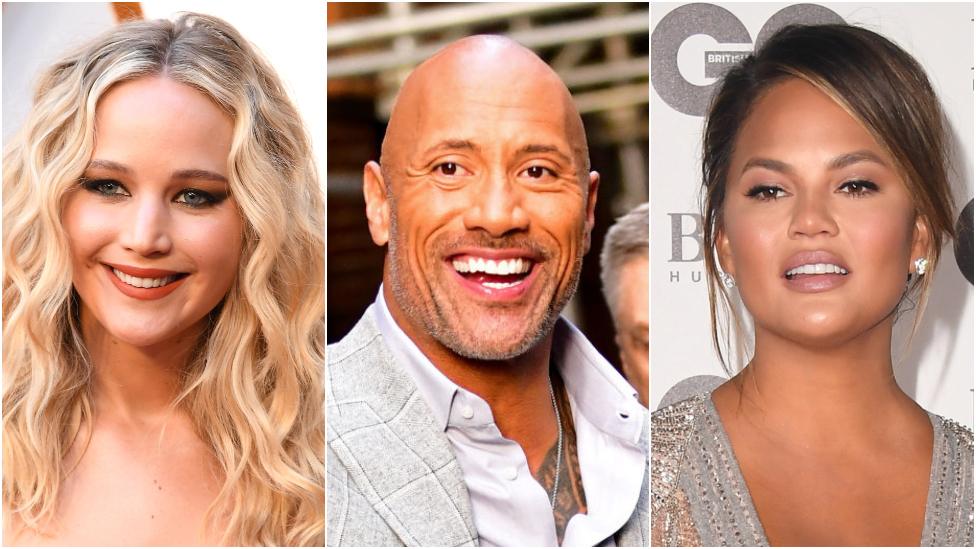Race Across the World: How the BBC series was made
- Published
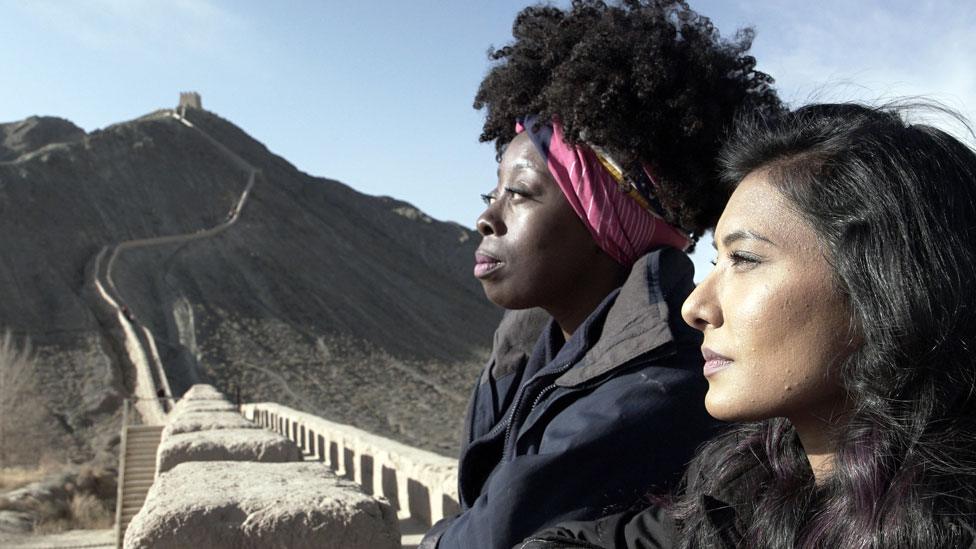
Natalie and Shameema at the Great Wall of China
Imagine planning a TV show where you had eight people travelling 12,000 miles over 50 days - and no idea exactly how they would do it.
That was the logistical nightmare for the team behind Race Across the World, which comes to its dramatic conclusion on Sunday.
The pairs were given the cost of a single airfare from London to Singapore, in cash - the catch being, they couldn't take a single flight.
Oh and they weren't allowed bank cards or smartphones. And had to check in at five checkpoints along the way, only learning the location of the next one when they arrived.
The journey would take in stunning sights, emotional epiphany, weird weather - and goat polo. Yes, goat polo. With countless possible options every single day, all that was going to take a lot more than a simple risk assessment form for the production team.
'Leap into the unknown'
"It's been massively challenging," says Mark Saben, executive producer of Race Across the World for Studio Lambert. "But I like doing things that scare me."
So here was the challenge, taken up by the teams (five started the race, and six pairs took part in all - but one team had to be replaced in the first episode due to a family emergency, and one was eliminated at the second checkpoint):
They had to travel the 12,000 or so miles overland - Singapore being chosen as it's the further place from the UK you can get to by rail and road
They were given: a world map; money belts containing £1,329 in pounds sterling each; a GPS device to track their progress; a travel guide with local job ads, so they could top up their cash along the way
The first team to arrive in Singapore would get a £20,000 prize to share
Each team had two members of the film crew embedded with them, but they had no say in any of the decisions
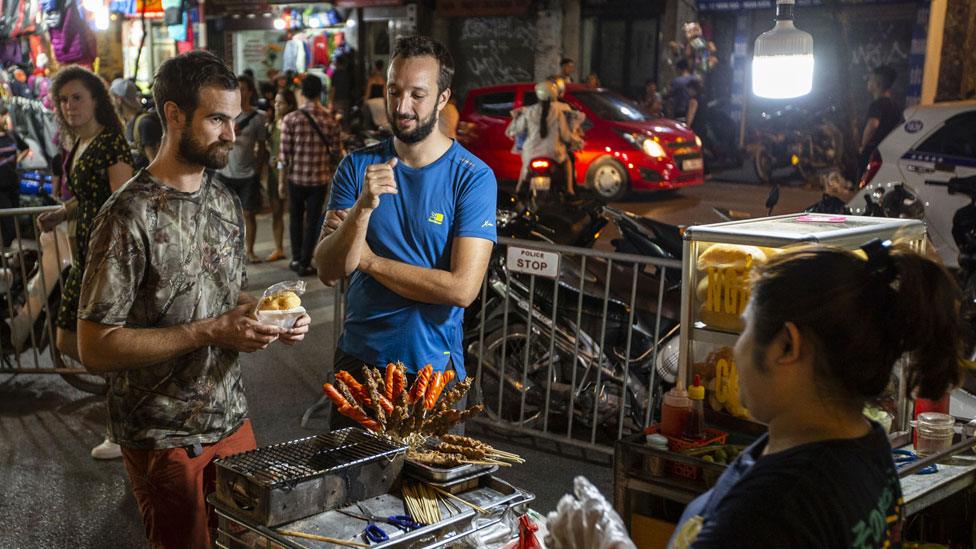
Felix and Josh sampling local delicacies in Vietnam
"It's been a year in the making," explains Mark. "We got two assistant producers to do a recce first. It's all very well doing theoretically, looking at timetables and things. But until someone does it for real, you don't know where the difficulties might lie.
"One of the poor sods had to do the actual trip again as they were attached to one of the teams - he was very stoical and didn't tell them until the very end though. As much as possible, we wanted it to feel like a dry run."
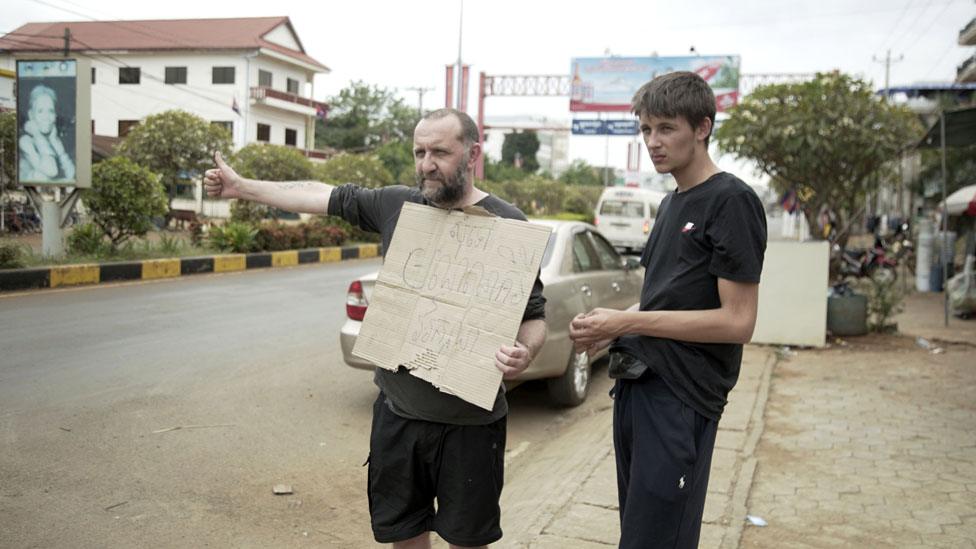
Father-and-son Darron and Alex hitch-hike in Cambodia
While things like visas and vaccines "for every conceivable country" were sorted in advance, there were some things they hadn't thought about.
"We found out currency changing places are never near the main hubs," he says. "And internet cafes were so scarce - because everyone has smartphones now. Things like that were really useful to find out."
The teams were:
Best friends Josh and Felix, both 32, from London
Father and son Darron, 48, and Alex, 20, from Bradford
Best friends Natalie, from London, and Shameema, from Manchester, both 38
Lifelong friends Sue, 57, and Clare, 58, from Bishop's Stortford and Leeds
Husband and wife Bindu, 48, and Jinda, 46, from Nottingham
They were replaced by retired couple Elaine and Tony, both 61, from North Yorkshire
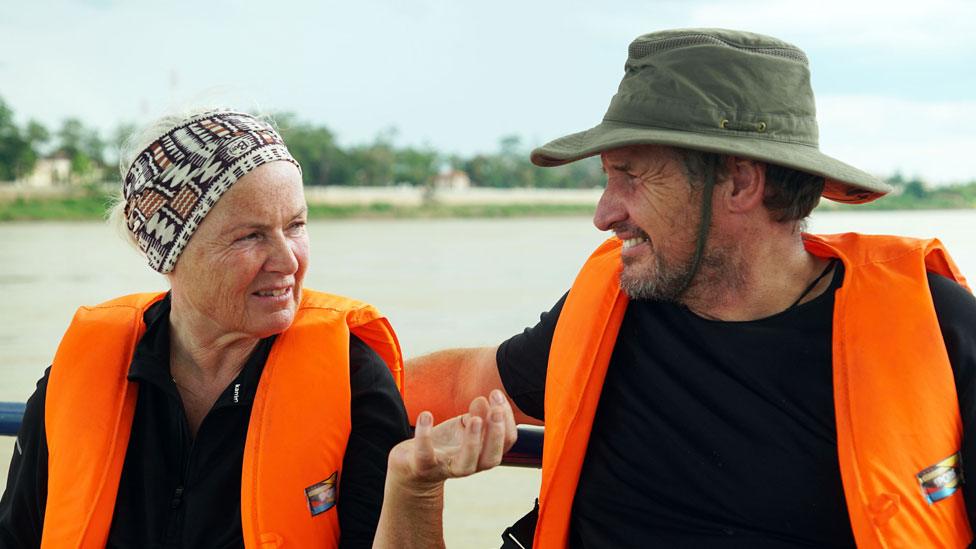
Elaine and Tony taking the scenic route
The lack of knowing in advance what was happening was part of the show's beauty, he says.
"They were given a licence to go where they wanted," says Mark. "It was so important they owned their own journey. And it made it more dynamic.
"Everything they did was their own decision. So when we had Darron and Alex seeing the elephants in Cambodia, Josh and Felix going climbing in China - it was their decision to spend their time or money that way, to have those experiences.
"The whole race was a balance between the speed and the experience. It's a once-in-a-lifetime trip. If you have the opportunity to stop in paddy fields, or rush ahead, what do you prioritise? Can you travel smartly and have these experiences too?"

What didn't viewers see..?
"You get the visual side - but you don't get the smells, the chaos, how you feel. You can be somewhere and feel bathed in its beauty. It floods the senses." - Darron
"Watching the series is like getting pictures back from Boots - you don't know how things will come out. Some journeys lasted 36 hours, and it's condensed to a few seconds." - Felix
"It's all of the minutiae - like the nine-year-old gymnast who performed an award-winning routine for us while we waited for a train in Uzbekistan. Or racing to a checkpoint and a taxi driver stopping to use a rest room, and a family there so excited to see us that they cooked us this huge lamb curry. We might have been set back, but it was an amazing experience." - Natalie
"Because we were the stand-in team, we got a call about 10, 11 at night - and had to be in London midday the next day. We had one night to pack and sort everything with the house, say bye to the grandkids. Then for 50 days, it was off the Richter scale!" - Tony

Asked if he ever doubted the format could work, Mark says: "All the way until the day we set off from Greenwich. It was all a leap into the unknown.
"The embedded crews were amazing because they had to do the same journey as them, sleeping alongside them on the bus, they weren't given a five-star hotel. So they were almost like a family, with its ups and downs.
"And while we had done recces, the teams found bits of the world which were totally surprising. Josh and Felix went off the beaten track, doing goat polo. It was so interesting having those windows into the world."
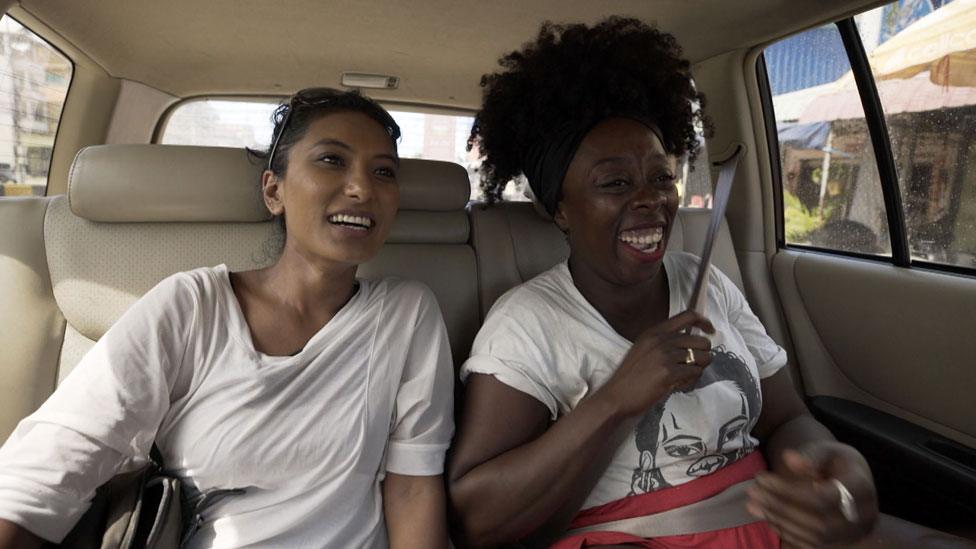
Shameema and Natalie, who have been friends for years, decided to take a trip before turning 40 next year
There was also a director of photography travelling behind the teams, and they had GoPro cameras when there wasn't as much space, like in boat cabins - meaning the cameras were there 24 hours a day, from the moment they woke up. Drones were used too, to capture the landscape.
A safety adviser worked on location in some places, and there was a medical support vehicle in place in some countries, travelling an hour or so behind the teams.
"But we had to be responsive," says Mark. "There was a typhoon in Vietnam, and the high winds in the Caspian Sea meant all the teams were stranded, on board the same boat."
While he initially thought it would make great TV, especially as all teams happened by chance to be on the same ferry, that feeling diminished when they were stuck for five days in deteriorating conditions.
But there were more positives than negatives.
"We had so much time, which is so unusual in TV. There were genuine epiphanies along the way. It's not often you get to step out of the rat race, reflect on your life and what it's all about.
"Hopefully it all looks elegant. But we were paddling away like mad under the surface."

Memorable moments
"We'd had a difficult time going through this military type place in China. There were guys with machine guns and we were followed. We were zapped of energy. Then we got to the Huangyao checkpoint and a Chinese man, who must have been about 310 years old, was playing a bamboo flute. It was such a moment of spiritual uplift. It was magical." - Tony
"It was amazing not having your phone - there was time to sketch, have in-depth conversations, in-depth thoughts. And every time we came to a new country, especially China which was an exciting, wild place, that feeling was so special too. We gained such an understanding of other cultures." - Felix
"My high and low point were the same. I was so stressed in Uzbekistan with the whole journey. People kept stopping to take pictures of me as they were intrigued - I hadn't expected that much interest in me as a black woman. It was like - what is this amazing creature? Shameema said to me, 'I would never give up on you, so don't give up on yourself.'" - Natalie
"The observatory in Samarkand was a stand-out. I've always had a fascination with the Silk Roads. I genuinely thought I was going to cry with emotion." - Darron
The final of Race Across the World is on BBC Two on Sunday at 20:00 BST, and available later on iPlayer.
- Published4 April 2019
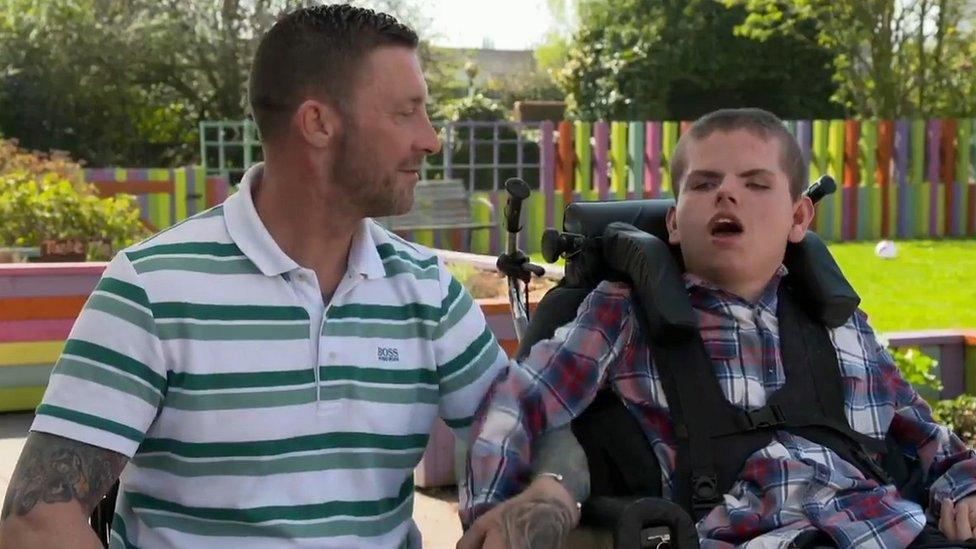
- Published1 December 2018
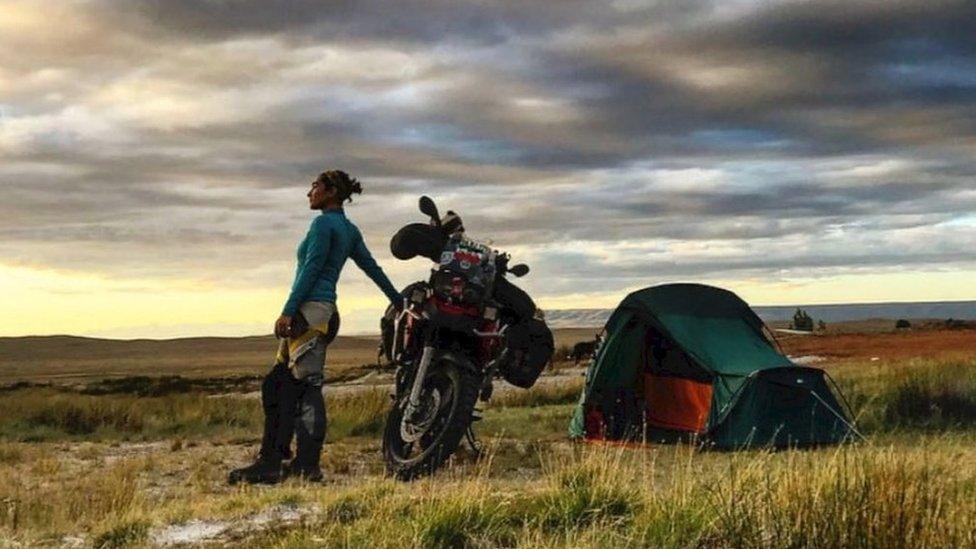
- Published9 September 2018
